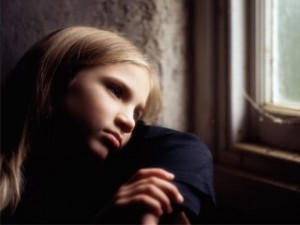Managedmoms.com writer Lisa Walton takes on a difficult topic today and she does a great job with it. Read on to learn about the signs of childhood depression because our kids don’t come with manuals and they don’t come with revised manuals when they become teenagers, either. Lisa did her homework and learned about signs we parents should watch for in our kids because childhood depression can happen to any kid and to any family.
Lisa says:
Our community is still reeling from the news of a local middle school student who took his own life a few weeks back. It gave many educators, parents, and students pause for thought. It breaks my heart to think of what that family is going through, and it really forces you to take a closer look in your own home. This could have happened to any one of us. Would we know the warning
signs? What’s the difference between normal childhood moodiness and childhood depression?
According to the American Academy of Child & Adolescent Psychiatry, about 5 percent of children and adolescents in the general population suffer from depression at any given point in time. Children under stress, who experience loss, or who have attention, learning, behavior or anxiety disorders are at a higher risk for depression. Depression also tends to run in families.
The behavior of depressed children and teenagers may differ from the behavior of depressed adults. Psychiatrists advise parents
to be aware of signs of depression in their youngsters.
Know the Signs
If one or more of these signs of depression persist, parents should seek help:
- Frequent sadness, tearfulness, crying
- Withdrawal from friends and activities once enjoyed
- Hopelessness
- Persistent boredom; low energy
- Social isolation, poor communication
- Lack of enthusiasm or motivation; low energy and chronic fatigue.
- Low self esteem, feeling of worthlessness or excessive guilt
- Indecision, lack of concentration or forgetfulness.
- Extreme sensitivity to rejection or failure
- Increased irritability, anger, or hostility
- Difficulty with relationships
- Frequent complaints of physical illnesses such as headaches and stomach aches
- Frequent absences from school or poor performance in school
- A major change in eating and/or sleeping patterns (i.e. significant weight loss, or insomnia)
- Talk of or efforts to run away from home
- Recurring thoughts or expressions of death, suicide or self destructive behavior
- Drug and alcohol abuse
Clinical depression is more than just “the blues” or having a bad day. It is different from the feelings of grief or sorrow that might follow a major loss, such as a death in the family. It’s not a personal weakness or flaw of their character. Children and
teens with clinical depression cannot simply “snap out of it”.
Depression is a form of mental illness that affects the whole body. It influences the way a person feels, thinks and acts. If left untreated, depression can lead to school failure, alcohol or drug use, and even suicide.
What Can Parents/Adults Do?
If parents or other adults in a young person’s life suspect a problem with depression, they should:
- Know the warning signs of depression.
- Take note of how long problems have been going on, how often they occur, and how severe they seem.
- See a mental health professional or the child’s doctor for evaluation and diagnosis.
- Get accurate information from libraries, hotlines and other sources.
- Ask questions about treatments and services.
- Talk to other families or find a family network organization.
It is important for people who continue to have questions to discuss their concerns with their provider. For those who are not satisfied with the health care they receive, they should ask for more information or seek help from other sources.
Help is Available
Depression is treatable! Early diagnosis and treatment are crucial for children with depression. Children who show signs of depression should be referred to and evaluated by a mental health professional that specializes in treating children and teens. Their diagnostic evaluation may include psychological testing, lab tests and consultation with other specialists. A comprehensive treatment plan may include psychotherapy, ongoing evaluation and monitoring, and in some cases medication. Ideally, this plan is developed with the family, and whenever possible, the child or teen is also involved in treatment decisions.
Parent’s Role
If you suspect that your child is depressed, take the time to listen to their concerns. Even if you don’t think the problem is of real concern, remember that it feels very real to them. It is important to keep the lines of communication open, even if your child seems to want to withdraw. Don’t try telling your child what to do. Instead, listen closely and you may discover more about the
issues causing the problems.
If you’re feeling overwhelmed or unable to reach your child, or if you continue to be concerned, seek help from a qualified
health care professional. Don’t allow guilt, embarrassment, or the stigma of mental illness; prevent you from getting
your child the help they may need.
About Lisa:
Lisa Walton–Parenting tips
Valley Teacher and Mother
Lisa Walton has been a teacher in the Valley for over 18 years. She holds a Bachelor’s Degree in Deaf Education from Illinois State University; and Master’s Degree in Special Education from Arizona State University. She currently works as an itinerant teacher, collaborating with regular education teachers in the public schools.








